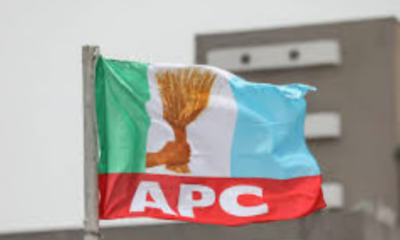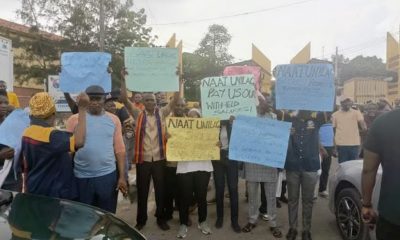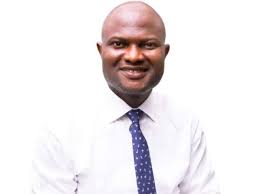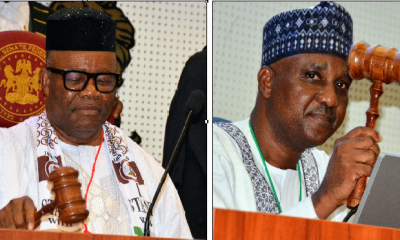Comments and Issues
Executive-Legislature endless squabbles
Published
7 years agoon
By
Olu Emmanuel
There does not seem to be light at the end of the Executive-Legislature tunnel in Nigeria. The avoidable tussle between the two arms of government started almost from the inception of the All Progressives Congress (APC) administration, in June 2015, when the 8th National Assembly was born. The Executive, headed by President Muhammadu Buhari, and other leaders of the APC decided that, “as the party was supreme”, in spite of section 1 (1) of the Constitution of the Federal Republic of Nigeria, 1999 (as amended), which provides that “this Constitution is supreme and its provisions shall have binding force on all authorities and persons throughout the Federal Republic of Nigeria”, the Executive, representing the “supreme” party, should appoint the who-is-who in the Legislature!
Wallowing in that erroneous belief, the Executive, aided and abetted by some party stalwarts, began to openly meddle in the affairs of the National Assembly by insisting on appointing the leadership of the Legislature, the second and independent arm of government, contrary to section 50 (1) (a) of the said Constitution which provides that the President and Deputy President of the Senate shall be elected by the members of the House from among themselves. Section 50 (1) (b) repeats, ipsissima verba, the foregoing provision in respect of the House of Representatives. So, the intra-party brouhaha continues between the Executive and the Legislature to the eternal detriment of peace, order and good government of the Federation.
A rancid case in point is the President’s refusal to listen to the National Assembly on its views on the Secretary to the Federal Government. Another case that is not any less rancid than the first one is the consistent refusal to do away with Mr. Ibrahim Magu after the Senate had twice refused to confirm him based on the negative reports on him by the Department of State Security (DSS). Section 2 (3) of the Economic and Financial Crimes Commission (EFCC) Act, 2004, provides that the Chairman and members of the EFCC Commission, shorn of ex-officio members, should be appointed by the President, subject to confirmation by the Senate. It should be noted that the foregoing provision is cast in iron: the Senate may confirm or refuse to confirm a presidential nominee; confirmation by the Senate is neither automatic nor mandatory. The Senate confirms only on the basis of a favourable report either by the Police or the DSS on the nominee.
In the instant case, Ibrahim Magu has been rejected twice on the basis of two negative reports and has been twice re-presented by the Presidency whose DSS (i.e. a security agency in the presidency), led by Alhaji Lawal Musa Daura, President Muhammadu Buhari’s own first cousin, prepared the damning reports on Ibrahim Magu, the President’s own choice!
ALSO SEE: Fayose, Fayemi feud worsens
Why, not a few Nigerians have asked, must the Nigerian electorate be treated to this rigmarole? Must the Senate confirm any and all of the President’s nominees whose appointments are subject to its confirmation? Why must the President re-present a rejected nominee after the fashion of Gen. Olusegun Obasanjo who, during his milito-civilian administration, unconstitutionally re-presented a nominated Minister, Prof. Aborishade, several times, until the phrase, “subject to confirmation of the Senate” lost its meaning!
Why must a second report be prepared by the same security agency (DSS)? Even if the second “report” was favourable to Ibrahim Magu (and it was not), why should the Senate not ignore it as a doctored report designed to paper over the cracks of the first report? In the light of all this, shall we conclude that there is a crisis or wahala within the Presidency itself, aside from the intra-party squabbles? Meanwhile, the Senate has, rightly in our view, stepped down, for two weeks, the assessment of the list of 27 Resident Electoral Commissioners submitted to it by the President for possible confirmation! And so, the “war” of balance of power between the Legislature and the Executive continues!
And what do we say about the Senate versus Col. Hameed Ibrahim Ali (Rtd.), the Comptroller-General of the Nigeria Customs Service (NCS) trial of strength? First, we must ask (because it would be interesting to know), under what law does the Senate insist that Mr. Ali should wear his uniform to appear before it? James Comey, the Director-General of the Federal Bureau of Information (FBI) appears before the American Congress pretty often without his official uniform, and the Congress has not cried blue murder! Is not Senate-Hameed Ali duel, therefore, the product of egoism on the part, not only of the Upper Chamber of the National Assembly, but of Col. Hameed Ali himself, who relies, for his confident assurance, on the President, his loving appointor?
For Nigeria to make any meaningful progress, the ruling party has to put its house in order. Both the Presidency and the National Assembly have to give peace a chance by adopting the attitude of give and take and obeying the provisions of the Constitution, which the officers of both arms of government swore to uphold before performing the functions of their offices.
You may like


Relationship between Oyetola, Omisore remains cordial — Osun APC


SSANU, NASU members block UNILAG gate over withheld salaries


Edo 2024: Idahosa writes INEC, claiming APC candidacy


Amazing Pictures expands to UK: Revolutionizing art investment with Pop-Up galleries


How National Assembly budget rose from N2.2bn in 1999 to N344.9bn in 2024


Thugs attack senator in Kogi govt house, six arrested
Trending

 Business6 days ago
Business6 days agoDollar crashes further against Naira at parallel market

 Business6 days ago
Business6 days agoRecapitalisation: Zenith Bank to raise funds in international capital market

 Education6 days ago
Education6 days agoArmy reveals date for COAS 2024 first quarter conference

 Crime6 days ago
Crime6 days agoFleeing driver injures two on Lagos-Badagry expressway

 Covid-196 days ago
Covid-196 days agoBritish legislator demands Bill Gates, other ‘COVID Cabal’ faces death penalty

 Business6 days ago
Business6 days agoZenith Bank surpasses N2trn earnings milestone

 Latest4 days ago
Latest4 days agoIsrael pounds Hezbollah with airstrikes after Iran attack

 Featured1 week ago
Featured1 week agoAmerican football icon OJ Simpson goes home

